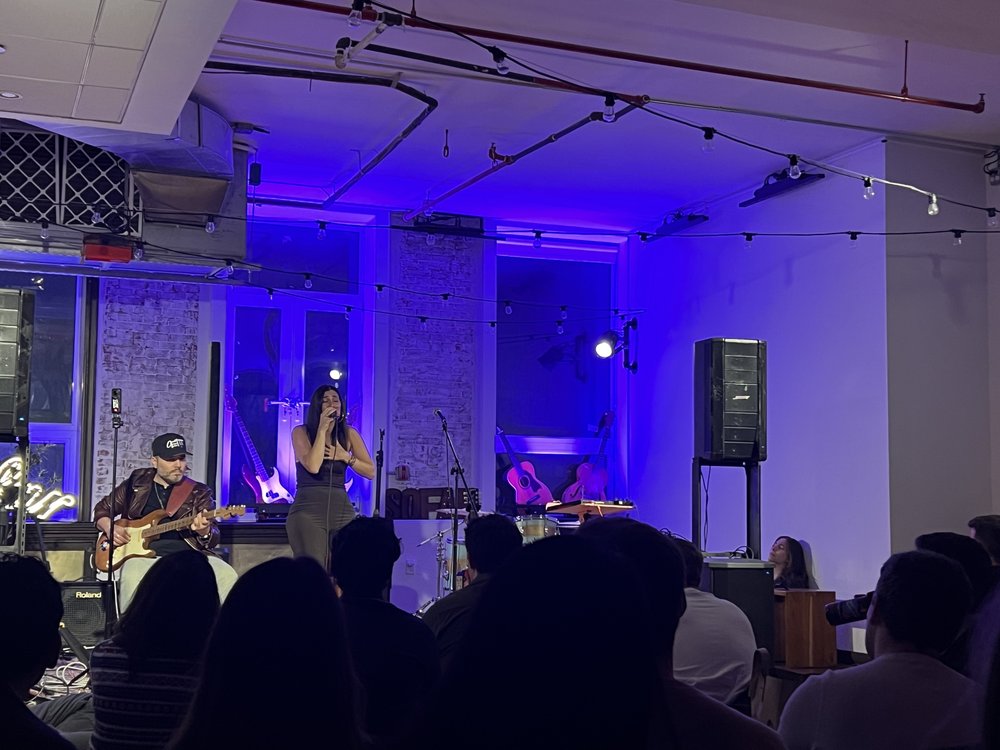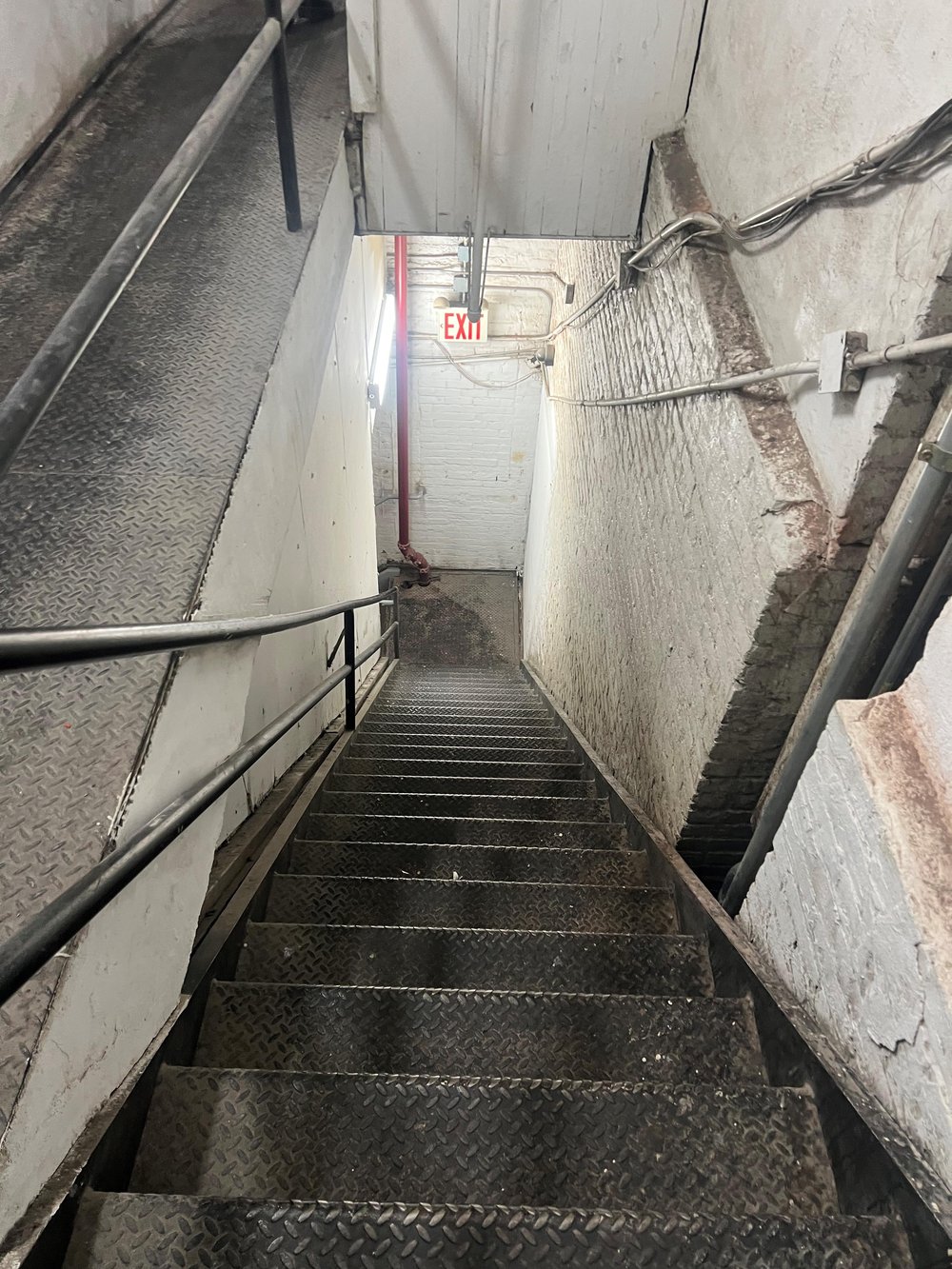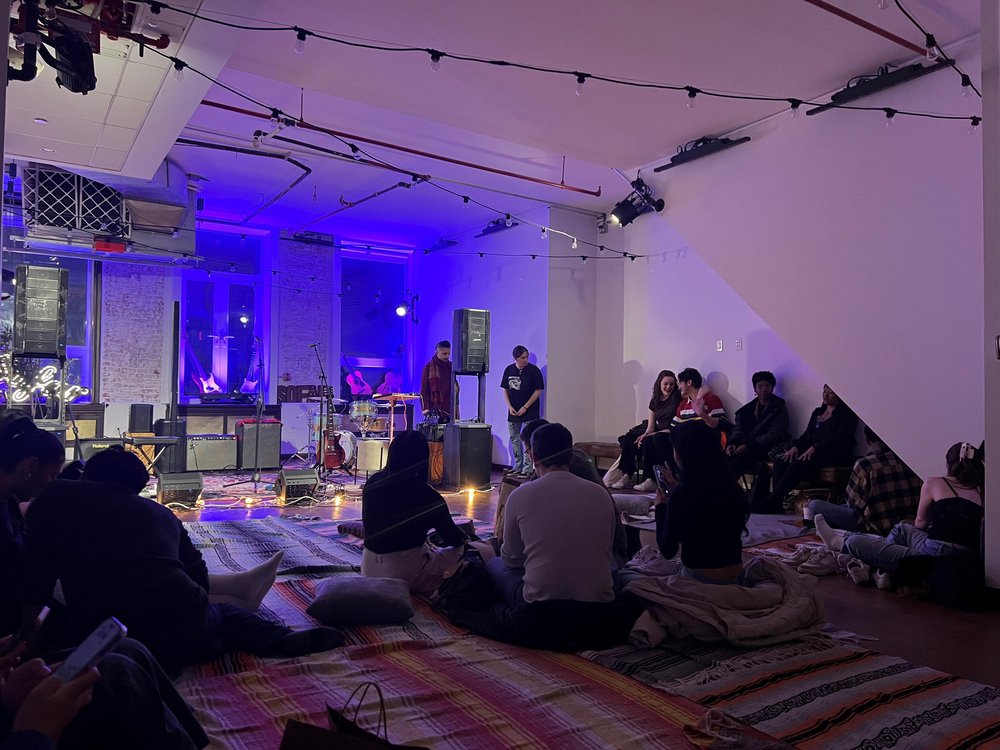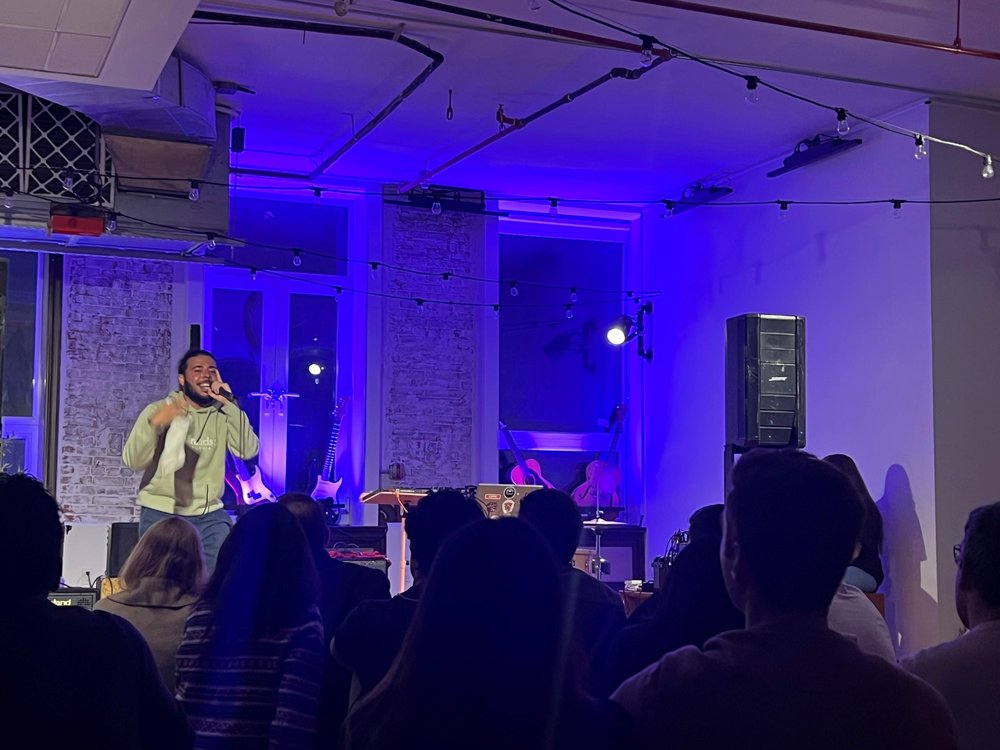This company throws $30 mystery concerts around NYC, so I tried it
April 4, 2025, 8 a.m.
Live music in NYC has become too pricey and more scarce.

Live music used to seem easier: I basically just stumbled into a bar or club and counted on someone screaming into the mic. In New York City, this was a viable way to support artists.
Things work differently now, if they work at all. Due to a confluence of factors — among them, lots of NYC’s indie venues have closed, and I don’t trip around the Lower East Side or Brooklyn like I used to — it can feel impossible to just go and catch a show.
The last time I had a laid-back ticket-buying experience was in 2017, when my husband and I went to see The War on Drugs at Terminal 5, last-minute, for $40 each. Since New York's post-pandemic reopening, making plans to see music usually involves screaming at your phone in a cold sweat, waiting in credit card-sponsored queues for “presale” tickets that could easily disappear before you’re done with your transaction.
So palpable is my frustration that, when a newfangled kind of live-music promoter called Sofar Sounds recently entered my Instagram feed advertising $30 tickets for a mystery show in Chinatown where I’d have to sit on the floor, I thought, ooh, tell me more.
Why I wanted to try Sofar
Sofar organizes tiny concerts at tiny venues for the tiny sum of $25-$30 per head. It’s the brainchild of Rafe Offer, a Londoner who was tired of gigs where the musicians had to compete with loud bargoers. Sofar's first show was in his living room.
The price is appealing, but so is the concept: The company hosts artists across genres in “unique, intimate venues” like art spaces, patios, speakeasies and hotels. The further I stray from bars and clubs, the more interested I am in alternatives.
Yes, there is a sizable catch. You don’t know the show’s exact location until 36 hours beforehand, the artist lineup isn’t revealed until you arrive and in some cases you’re not even sure of the music genres when you’re buying tickets. (Theory: Buying blind may be risky, but it’s also a reprieve from the multitude of options that now compete for New Yorkers’ money and attention online and IRL.)
A “cozy,” BYOB, “mostly floor seating” show in Chinatown: fun adventure or disgusting misadventure? I pictured a scuzzy space with clanging radiators, decades’ worth of lead paint and sagging wood floors — to be fair to Chinatown, though, that’s probably just my 2004 apartment hunt trauma talking.
The price was right, so I nabbed tickets and roped in some friends.
What it was like to go to the Sofar show
As I emerged from the Canal Street station, I slipped on a seafood monger’s fish juice, which I took as a bad omen for floors in general. After popping into a liquor store on Mott for a canned margarita, I headed to the Sofar show on Walker.
However, the vibe shifted fast when I entered the second-floor space where the artists would perform. It turned out to be Sofar’s headquarters, a sleek workspace decked out with blankets and pillows. I was mentally transported to Laughing Lotus, the quirky Chelsea yoga studio of yore, and worked to maintain space perception: I am at a concert.


It didn’t help that guests started kicking off their shoes. We’re doing this? Embodying when-in-Rome, I followed their lead, grateful I’d worn decent socks. I got settled on the floor, saving a spot for my friends and doubly grateful for the forgiving pants I’d purchased specifically for this experience — I’d been sampling giant sandwiches all day.
People brought dinner. I saw Chick-fil-A bags and smelled something rank (broccoli? kimchi?). Wine corks popped and I cracked open my cocktail. The show started right on time — now I knew this was not a regular concert.
First to take the stage was Julea (she goes by first name only), who chattered to herself, her guitarist and the crowd adorably as she settled on a stool. She drew us in with “Good Time,” a song about a sham relationship she’s finally seeing with clear eyes. The crowd seemed engrossed by Julea’s velvety voice and soulful eyes as she took us through a few more of her own, plus a rendition of a Goo Goo Dolls song that I liked much more than the original.
Julea was followed by Sufi artist Umer Piracha and then July Quin, a Bronx hip-hop artist and NYC public school teacher.
The artists were passionate and engaging. It was a reminder of the remarkable depth of talent and creativity in New York — Sofar’s curators have plenty to choose from.
“I had been trying to get on Sofar’s radar for about a year, I was up their a-- to be totally honest,” Julea later told me. “God bless them, they finally answered me.”

After the show, I didn’t know whether to feel sad or hopeful. The genre mix was diverse, perhaps too eclectic for some. Being that we weren’t in the Sheep Meadow, I didn’t love the whole crispy-chicken-sandwich-strangers-sock-feet combo — ironically, this was maybe the most un-New York experience I have ever had in New York.
But I feel like the artists got much more focused attention than they would in a bar packed with tipsy flirters.
“It makes you fall in love with the process all over again, and hope that there are people you've never met who are doing their thing,” Quin said. “In order for anything to move forward, especially in the music scene, there has to be an audience that's willing to take the chance.”
After the show, my friend Anne, who I can count on to put the kibosh on anything lame, said, “That was great! An interesting and affordable night out.” But she wasn’t exactly sad when it was over and she rushed us to our reservation in Dimes Square.
Does Sofar represent the last gasp of an almost-dead music scene that makes it nearly impossible for artists to make a living and bring people together? Or is Sofar the future, a reminder that in New York, art is like water: It will always find a way to flow?
What to know before you go
Bring socks and comfy clothes: The floor was clean. And trust me, it was downright spotless compared to the beer-sticky floor at Pianos back in the day. Sitting on the floor made the Sofar show intimate and friendly. But if that’s not your thing, this spring, Sofar has a lineup of shows where you’re guaranteed a seat.
You might discover new music to love: With six to eight shows each week in New York, and dozens of others in cities around the world, Sofar is giving a stage to incredible talent. More established artists occasionally drop in to test new material, too, says Allison Bond, Sofar’s General Manager for New York operations. A few weeks ago, Universal’s Mark Ambor surprised guests. It turns out a good number of New York Sofar artists have gained higher profiles — Soccer Mommy, Del Water Gap and Porches to name a few.
Follow the art: Are we going to be a city that supports artists, or are we just going to keep stuffing our pockets with money, our street corners with banks and our homes with more stuff? Artists sacrifice financial stability and more to reflect our culture back to us. In the end, I was fine to forgo a chair for two hours to support the cause. I’ll probably follow Anne’s lead and keep my shoes on next time.
Sandwiches in NYC have become enormous and too big to eat. So I tried some. As Buy Nothing groups expand across NYC, so does the drama The NYPL's special collections room has become 'Club Didion'